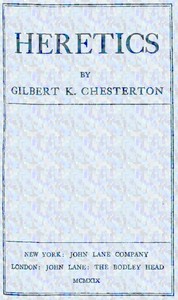Heretics by G. K. Chesterton
"Heretics" by G. K. Chesterton is a critical examination and philosophical treatise written in the early 20th century. The book addresses the moral and intellectual confusion of modern society, particularly the shifting definitions and attitudes toward orthodoxy and heresy. Chesterton critiques prominent figures of his time, such as Rudyard Kipling and H.G. Wells, as he explores the erosion of philosophical thought and the significance of fundamental beliefs in literature and politics. At
the start of "Heretics," Chesterton lays the groundwork for his arguments by contrasting the ancient notions of heresy and orthodoxy with contemporary perspectives. He observes that what was once considered honorable—standing firm in one's beliefs against the crowd—has become inverted; now, the term "heretic" is often worn as a badge of pride by those who release themselves from conventional truths. Chesterton discusses the dangers of abandoning overarching ideals, claiming that society is losing sight of the broader questions of existence, morality, and philosophy in favor of ephemeral details. The opening portions introduce his intention to confront various notable thinkers, positioning them as representatives of flawed philosophies that neglect the essential truths of human experience. (This is an automatically generated summary.)
Read or download for free
| How to read | Url | Size | |||
|---|---|---|---|---|---|
| Read now! | https://www.gutenberg.org/ebooks/470.html.images | 395 kB | |||
| EPUB3 (E-readers incl. Send-to-Kindle) | https://www.gutenberg.org/ebooks/470.epub3.images | 422 kB | |||
| EPUB (older E-readers) | https://www.gutenberg.org/ebooks/470.epub.images | 421 kB | |||
| EPUB (no images, older E-readers) | https://www.gutenberg.org/ebooks/470.epub.noimages | 282 kB | |||
| Kindle | https://www.gutenberg.org/ebooks/470.kf8.images | 658 kB | |||
| older Kindles | https://www.gutenberg.org/ebooks/470.kindle.images | 634 kB | |||
| Plain Text UTF-8 | https://www.gutenberg.org/ebooks/470.txt.utf-8 | 381 kB | |||
| Download HTML (zip) | https://www.gutenberg.org/cache/epub/470/pg470-h.zip | 690 kB | |||
| There may be more files related to this item. | |||||
Similar Books
About this eBook
| Author | Chesterton, G. K. (Gilbert Keith), 1874-1936 |
|---|---|
| Title | Heretics |
| Note | Wikipedia page about this book: https://en.wikipedia.org/wiki/Heretics_(book) |
| Contents | Introductory remarks on the importance of orthodoxy -- On the negative spirit -- On Mr. Rudyard Kipling and making the world small -- Mr. Bernard Shaw -- Mr. H.G. Wells and the giants -- Christmas and the aesthetes -- Omar and the sacred vine -- The mildness of the yellow press -- The moods of Mr. George Moore -- On sandals and simplicity -- Science and the savages -- Paganism and Mr. Lowes Dickinson -- Celts and celtophiles -- On certain modern writers and the institution of the family -- On smart novelists and the smart set -- On Mr. McCabe and a divine frivolity -- On the wit of Whistler -- The fallacy of the young nation -- Slum novelists and the slums -- Concluding remarks on the importance of orthodoxy. |
| Credits | Produced by Mike Piff and Martin Ward. HTML version by Al Haines. |
| Reading Level | Reading ease score: 67.5 (8th & 9th grade). Neither easy nor difficult to read. |
| Language | English |
| LoC Class | PR: Language and Literatures: English literature |
| Subject | Apologetics |
| Subject | Chesterton, G. K. (Gilbert Keith), 1874-1936 |
| Category | Text |
| EBook-No. | 470 |
| Release Date | Mar 1, 1996 |
| Most Recently Updated | Jan 16, 2024 |
| Copyright Status | Public domain in the USA. |
| Downloads | 1587 downloads in the last 30 days. |
| Project Gutenberg eBooks are always free! | |

